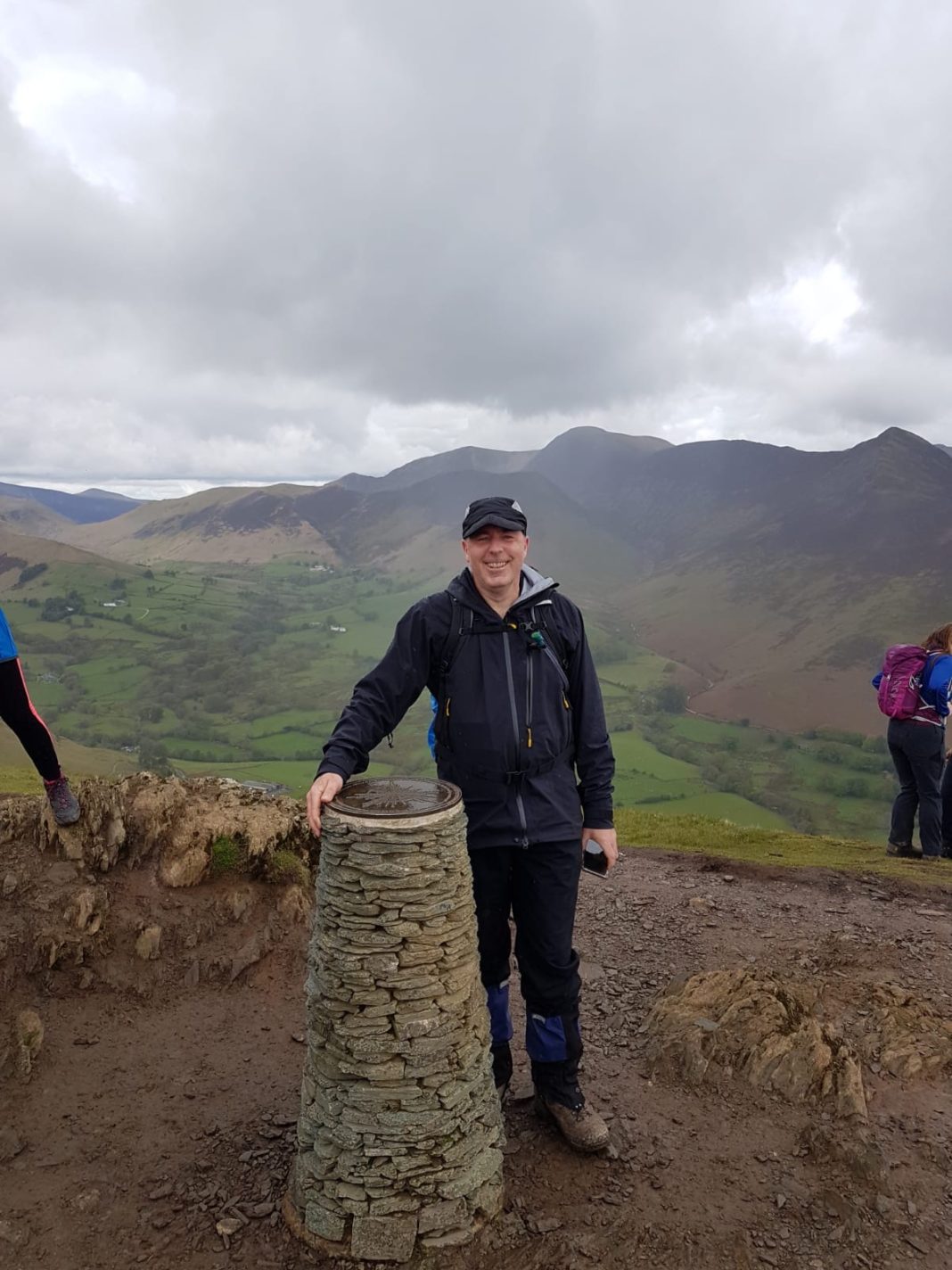A man living with a brain tumour is in training to take on the Yorkshire Three Peaks Challenge to help find a cure for the disease.
Paul Saunders, 51, from Billingham, Teesside, is setting out on the challenge to raise funds for Brain Tumour Research. On Saturday 5 June, he will walk a 25-mile circular route which will see him summit Pen-y-ghent, Whernside and Ingleborough, the three highest peaks in Yorkshire. Joined by his partner Julie Thompson, 46, and friends, Derek, 48, and Lynne Moore, 46, from Stockton, Teesside, the team is aiming to complete the challenge within 12 hours.
Paul was inspired to raise funds for the charity after he was diagnosed with a grade 2 glioma in August 2020, after suffering a seizure whilst cycling to work.
He said: “For a few years I’d been experiencing a strange sensation in my left hand, but I wasn’t concerned and just put it down to being a trapped nerve in my shoulder. On 13 August, I was cycling to James Cook University Hospital in Middlesbrough, where I work in the IT department when I started feeling a sensation in my hand. I was shaking my hand to try and get rid of the feeling when I hit a hole in the road. It jarred my whole body and that’s when I knew something wasn’t right.”
He stopped his bike and put his hand in the air to let people know he needed help: “I’m very grateful to the people who stopped to help me as I started having a full seizure by the side of the road. They thought I might be having a stroke and called an ambulance, which took me to A&E at James Cook University Hospital.”
After a CT scan showed something on his brain, doctors performed an MRI scan and Paul was told he had a brain tumour. The grade 2 glioma is diffuse, meaning it is infiltrating healthy brain tissue and cannot be completely removed.
Paul continued: “I was obviously concerned when they told me I had a brain tumour, but thankfully it is low-grade. It is being monitored with regular scans every four months and my consultant is quite happy that the tumour is essentially dormant and behaving itself.
“My latest scan was on 20 May and I’m awaiting the results from that. If anything changes, we’ll adjust my treatment then.”
After his diagnosis, Paul decided he wanted to take on a challenge to help make a difference. He is raising funds for Brain Tumour Research to support the charity’s vital work to help find a cure for the disease.
Along with Julie, he has been training in the Cleveland Hills, which are on their doorstep in North Yorkshire. The couple has recently made a weekend trip to the Lakes to prepare their legs to conquer the three peaks: “We’re quite fit – Julie runs and I play hockey and cycle. I’ve done a couple of coast-to-coast cycles for charity, but I’m looking forward to a bit of a different challenge.”
He added: “I wanted to do something to turn my diagnosis into a positive. One of our friends is a GP and she told us how difficult brain tumours are to diagnose because nobody knows what causes them and there are so many different symptoms.
“Before my diagnosis I had no idea that brain tumours are the biggest cancer killer of children and adults under the age of 40. If I can use my story to help raise awareness of the disease, then that will be a good outcome.
“We’re lucky to have a great group of friends who are getting involved in lots of different ways. It’s going to be a challenge for each and every one of us, but we’re resilient and determined to help raise much-needed funds for this excellent charity.”
Brain tumours kill more children and adults under the age of 40 than any other cancer, yet historically just 1% of the national spend on cancer research has been allocated to this devastating disease.
Joe Woollcott, community development manager for Brain Tumour Research, said: “We were sorry to learn about Paul’s diagnosis and wish him all the best. We’ll be cheering the team on as they complete their amazing challenge.
“Paul’s story reminds us that brain tumours are indiscriminate; they can affect anyone at any age. We are determined to continue in our mission to find better outcomes and ultimately a cure for this terrible disease.”
Brain Tumour Research funds sustainable research at dedicated centres in the UK. It also campaigns for the Government and the larger cancer charities to invest more in research into brain tumours in order to speed up new treatments for patients and, ultimately, to find a cure. The charity is calling for a national annual spend of £35 million in order to improve survival rates and patient outcomes in line with other cancers such as breast cancer and leukaemia and is also campaigning for greater repurposing of drugs.
To donate to Brain Tumour Research via Paul’s fundraising page, please visit: https://www.justgiving.com/fundraising/PaulThreePeaksChallange


























